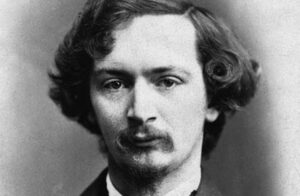Algernon Swinburne
Thomas Merton was clear that any act of creation was a taking part in the creative activity and power of God – the Creator. He saw it as working in common with the creative will ‘that transcends both our freedom and our world.’ Anything creative that is separated or divorced from being grounded as divine, is, then, by definition, ultimately illusory and self-contradictory. Merton goes as far as seeing it as an idolatrous divinization of the self as its own god, and, independent source of life and energy.
If our creativity is apart from God, Merton thought, it was then only to do with power and can become dangerous; especially when identified with the power to destroy and to prove one’s control over nature and other humans, as for example in inventing new ways of warfare. How prophetic Merton was … So, for him the absolute starting point had to be dependence on God, and a refusal to turn one’s own creativity against creation.
True creativity becomes, for Merton, a participation in creating one’s own identity, and of becoming one’s true self. In that sense it does seem that creativity can be a way of processing, and then hopefully integrating good and bad experiences. Perhaps too, true creativity is found in those who wouldn’t consciously acknowledge a grounding in the divine, but are searching for a form of truth and meaning and poetic beauty – aspects of divinity.
Another of the poets that Leonard Shengold analyses in his work on soul murder and creativity is Algernon Swinburne, who grew up physically abused by regular beatings at his boarding school – Eton. Flagellation seemed then to become an obsession in Swinburne’s poetry, novels and letters, an obsession encapsulated by the title of a collection called ‘The Flogging Block’. Deeply psychologically damaged and physically challenged – he was quite small with an overlarge head, and some sort of neurological condition that set him apart as a child – he was determined to overcompensate for his physical inferiority by daring and dangerous feats of swimming and climbing, seeking out suffering and at times provoking physical punishment. Swinburne came to associate sado-masochism with ecstatic pleasure; he wrote:
‘Once before giving me a swishing that I had the marks of for more than a month, [the tutor] let me saturate my face with eau-de-cologne. He meant to stimulate and excite the senses by that preliminary pleasure so as to inflict the acuter pain afterwards on their awakened and intensified susceptibility.’
(Surely an example of the deviant destructive creativity of the English public-school tradition – not grounded in the divine, but in power and control.)
Swinburne, then, in part, never really grew up, and unlike Elizabeth Bishop (in an earlier post) seemed to have little insight as an adult into his ‘perverse preoccupation.’ Drinking heavily, and for a while visiting flagellation brothels, Swinburne equated being beaten with being loved. He had no help in resolving the damage to his soul; there were no therapists to see him, and Swinburne died in 1909, ten years before Sigmund Freud’s paper on ‘A child is being beaten.’
And yet, and yet, and despite his masochism and anti-theism, the creative spirit lived in Swinburne, he responded to it and it gave him an identity – not in the powerful, destructive way that Merton is concerned about, but by creating poetry from his troubled experience that 100 years later still resonates in these melancholy verses from ‘The Garden of Proserpine’:
From too much love of living,
From hope and fear set free,
We thank with brief thanksgiving
Whatever gods may be
That no life lives for ever;
That dead men rise up never;
That even the weariest river
Winds somewhere safe to sea.
Then star nor sun shall waken,
Nor any change of light:
Nor sound of waters shaken,
Nor any sound or sight:
Nor wintry leaves nor vernal,
Nor days nor things diurnal;
Only the sleep eternal
In an eternal night.
Full poem at: https://www.poetryfoundation.org/poems/45288/the-garden-of-proserpine
